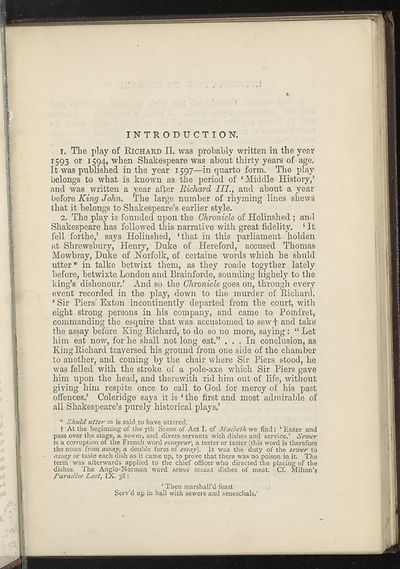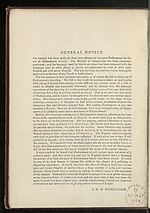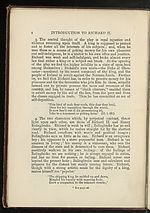Download files
Complete book:
Individual page:
Thumbnail gallery: Grid view | List view

INTRODUCTION.
1. The play of Richard II. was probably written in the year
1593 or 1594, when Shakespeare was about thirty years of age.
It was published in the year 1597—in quarto form. The play
belongs to what is known as the period of ‘ Middle History,’
and was written a year after Richard III., and about a year
before King John. The large number of rhyming lines shews
that it belongs to Shakespeare’s earlier style.
2. The play is founded upon the Chronicle of Holinshed ; and
Shakespeare has followed this narrative with great fidelity. ‘ It
fell forthe,’ says Holinshed, ‘that in this parliament holden
at Shrewsbury, Henry, Duke of Hereford, accused Thomas
Mowbray, Duke of Norfolk, of certaine words which he shuld
utter* in talke betwixt them, as they roade togyther lately
before, betwixte London and Brainforde, sounding highely to the
king’s dishonour.’ And so the Chronicle goes on, through every
event recorded in the play, down to the murder of Richard.
‘ Sir Piers Exton incontinently departed from the court, with
eight strong persons in his company, and came to Pomfret,
commanding the esquire that was accustomed to sewf and take
the assay before King Richard, to do so no more, saying : “ Let
him eat now, for he shall not long eat.” ... In conclusion, as
King Richard traversed his ground from one side of the chamber
to another, and coming by the chair where Sir Piers stood, he
was felled with the stroke of a pole-axe which Sir Piers gave
him upon the head, and therewith rid him out of life, without
giving him respite once to call to God for mercy of his past
offences.’ Coleridge says it is ‘ the first and most admirable of
all Shakespeare’s purely historical plays.’
* Shuld utter =■ is said to have uttered.
t At the beginning of the 7th Scene of Act I. of Macbeth we find: ‘ Enter and
pass over the stage, a sewer, and divers servants with dishes and service.’ Sewer
is a corruption of the French word essayeury a tester or taster (this word is therefore
the noun from assay, a double form of essay). It was the duty of the sewer to
assay or taste each dish as it came up, to prove that there was no poison in it. The
term was afterwards applied to the chief officer who directed the placing of the
dishes. The Anglo-Norman word sewes meant dishes of meat. Cf. Milton’s
Paradise Lost, IX. 38 :
‘ Then marshall’d feast
Serv’d up in hall with sewers and seneschals,’
1. The play of Richard II. was probably written in the year
1593 or 1594, when Shakespeare was about thirty years of age.
It was published in the year 1597—in quarto form. The play
belongs to what is known as the period of ‘ Middle History,’
and was written a year after Richard III., and about a year
before King John. The large number of rhyming lines shews
that it belongs to Shakespeare’s earlier style.
2. The play is founded upon the Chronicle of Holinshed ; and
Shakespeare has followed this narrative with great fidelity. ‘ It
fell forthe,’ says Holinshed, ‘that in this parliament holden
at Shrewsbury, Henry, Duke of Hereford, accused Thomas
Mowbray, Duke of Norfolk, of certaine words which he shuld
utter* in talke betwixt them, as they roade togyther lately
before, betwixte London and Brainforde, sounding highely to the
king’s dishonour.’ And so the Chronicle goes on, through every
event recorded in the play, down to the murder of Richard.
‘ Sir Piers Exton incontinently departed from the court, with
eight strong persons in his company, and came to Pomfret,
commanding the esquire that was accustomed to sewf and take
the assay before King Richard, to do so no more, saying : “ Let
him eat now, for he shall not long eat.” ... In conclusion, as
King Richard traversed his ground from one side of the chamber
to another, and coming by the chair where Sir Piers stood, he
was felled with the stroke of a pole-axe which Sir Piers gave
him upon the head, and therewith rid him out of life, without
giving him respite once to call to God for mercy of his past
offences.’ Coleridge says it is ‘ the first and most admirable of
all Shakespeare’s purely historical plays.’
* Shuld utter =■ is said to have uttered.
t At the beginning of the 7th Scene of Act I. of Macbeth we find: ‘ Enter and
pass over the stage, a sewer, and divers servants with dishes and service.’ Sewer
is a corruption of the French word essayeury a tester or taster (this word is therefore
the noun from assay, a double form of essay). It was the duty of the sewer to
assay or taste each dish as it came up, to prove that there was no poison in it. The
term was afterwards applied to the chief officer who directed the placing of the
dishes. The Anglo-Norman word sewes meant dishes of meat. Cf. Milton’s
Paradise Lost, IX. 38 :
‘ Then marshall’d feast
Serv’d up in hall with sewers and seneschals,’
Set display mode to:
![]() Universal Viewer |
Universal Viewer | ![]() Mirador |
Large image | Transcription
Mirador |
Large image | Transcription
| Antiquarian books of Scotland > Languages & literature > Shakespeare's Richard II > (5) |
|---|
| Permanent URL | https://digital.nls.uk/109384930 |
|---|
| Description | Thousands of printed books from the Antiquarian Books of Scotland collection which dates from 1641 to the 1980s. The collection consists of 14,800 books which were published in Scotland or have a Scottish connection, e.g. through the author, printer or owner. Subjects covered include sport, education, diseases, adventure, occupations, Jacobites, politics and religion. Among the 29 languages represented are English, Gaelic, Italian, French, Russian and Swedish. |
|---|

